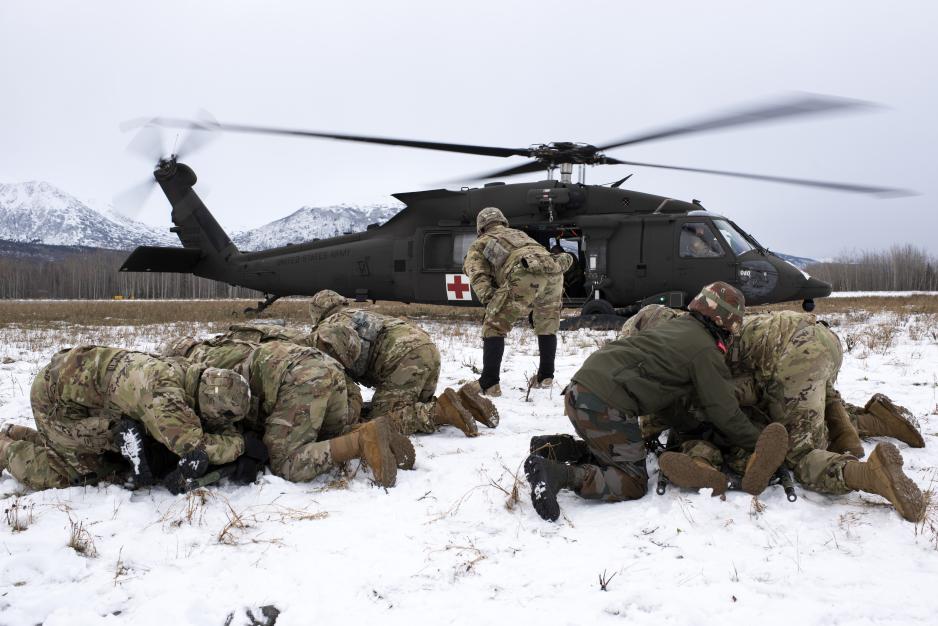Arne O. Holm says India Puts Up a Fight Against China in the Arctic

Indian and American forces during a joint military exercise in Alaska in October of 2021. (Photo: U.S. Air Force by Alejandro Peña))
(Commentary) It is an almost accepted truth that China is gaining ever greater power over Russia. But less attention surrounds India's entry into the Arctic. Both of these populous states are targeting Arctic resources.
For a long time, there was a more cautious approach to the resources in the Arctic. Climate change, environmental concerns, and investment in the green industry were almost about to prove them right – the people who said there was no race for resources going on in the north.
But that was before Russia attacked Ukraine.
Aggressive hunt for resources
Now almost everything in the north revolves around security policy and an increasingly more aggressive hunt for energy and minerals.
Western countries sanctioning Russian gas, as we have reported on several times in High North News, has not led to any decrease in Russian oil and gas production. Nor in the export of these products. They just travel somewhere else, mainly to China and India.
That also means that the traffic along the Northern Sea Route, along Russia's military coast in the north, will increase in the years coming. Russia, together with China, invests heavily in keeping this route open and secured throughout increasingly larger parts of the year. That is how they avoid a longer and more expensive journey via Europe. Recently, Russia has almost hoarded ships in the world market for the export of oil and gas.
But that was before Russia attacked Ukraine.
This reminds us that only a few of the world's countries sanction Russia because of the war.
The west's major trade policy challenge in the war with Russia has been China. A China that is not directly contributing to Russia's war against Ukraine, but which, through investments, loans, and purchase of energy, goes a long way in financing that same war. China does so while simultaneously participating in an increasingly hostile trade war with the US and parts of Europe.
Indian self-interest
From India, this rivalry is beheld with great interest, not to mention self-interest.
India's growing economy also demands increased resources. That China is to dominate the trade and influence over Russia is therefore a problem for India.
In a broadly based analysis written by Indian research at Manohar Parrikar Institute for Defence Studies and Analyses New Dehli, one can read about some relatively unfiltered thoughts about India's ambitions in the Arctic. The institute describes itself as independent from Indian authorities, but is financed by the Indian state, and can therefore not exist in a research policy vacuum.
For these, the war is not a problem, but an opportunity.
For these researchers, Russia's war is not a problem, but an opportunity for Indian expansion, not only into Russia and the Arctic but also an opportunity to create closer ties to what might be left of the Arctic Council when Norway takes over the chairmanship in May. In contrast to China, there is no visible conflict between the Arctic Council and India.
That might best be illustrated by the fact that India has participated in military exercises with American troops in Alaska for several years. It has to do with altitude training in a cold climate.
According to the Indian researchers, what they call "NATO's expansion", in addition to cooperation on energy and minerals, lead to closer ties between China and Russia. At the same time, they write, this cooperation weakens Russia's position and power in the Arctic.
Closer to Russia
The researcher's conclusion, while the war in Ukraine rages worse than ever, is that this is a situation that opens up for closer and more committed cooperation between Russia and India.
Because, as they correctly write, the war against Ukraine has weakened Russia's connection with other Arctic countries, with the exception of China.
The Arctic is a smörgäsbord of energy and minerals.
"But Russia needs alternative partners," conclude the researchers and point to an already extended political and economic cooperation between India and Russia.
"This emphasizes the degree of trust and mutual cooperation between the two countries. The Arctic arises as a new arena to strengthen the ties between India and Russia."
While Russia kills without mercy in Ukraine, the researchers at this state-financed institute recommend strengthened and closer cooperation with Russia.
Much can be said for such an approach to a Europe at war. Perhaps the most important thing, however, is that much of the search for resources in the Arctic overlooks the fact that some of us live here.
Not even a bloody war, with clear consequences for the security policy stability in the High North, can shake the view of the Arctic as a smörgäsbord of energy and minerals.
Also read
This commentary was originally published in Norwegian and has been translated by Birgitte Annie Molid Martinussen.


